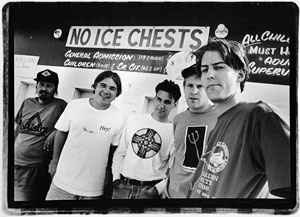Last night, Mr. Royale and I went to see Australian band Tame Impala perform at a small club here in San Francisco. They focused on their 2010 album, Innerspeaker, which could probably be safely be described as “retro” a la 1967. The show was all out psychedelia: barefoot musicians, long-neglected hair, oscilloscope images morphing in time with the chords, large amounts of medicinal herb wafting around us. And Tame Impala are clearly old-school in their influences: Wikipedia lists, among them, Cream, Love, Blue Cheer, CSNY, Steppenwolf, Jefferson Airplane. So when it came time for the encores, I was expecting something in a similar vein. Instead, as the distinct bass line and rim shots were painted in, we got an amazing, full court press cover of Massive Attack‘s 1997, “Angel.” It was followed by another cover, which neither of us initially identified, but with a little research found to be Blue Boy‘s 1998 dance hit, “Remember Me.”
I’m used to encores or other performed covers being used to cite PREVIOUS musical influences: for example I can recall Grizzly Bear doing a cover of the 1962 Spector song, “He Hit Me (and It Felt Like a Kiss).” So what was with Tame Impala fast-forwarding 30 years to reference a more recent musical genre (although “trip-hop,” which could be seen as a bastard child of the earlier psychedelia, and “Remember Me” samples a ’60s single by Marlena Shaw)?
Have you had an experience of an unexpected encore? Did it make you change your mind about the band, for better or for worse?


